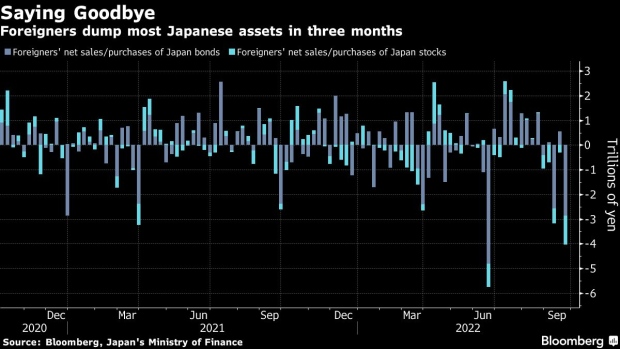Sep 28, 2022
Foreign Exodus From Japan Assets Signals Demand for Liquidity
, Bloomberg News

(Bloomberg) -- Japan’s capital markets suffered the biggest foreign outflow in three months last week as growing fears of a global downturn fueled a search for liquidity.
Non-resident investors offloaded a net 4.04 trillion yen ($28 billion) of Japanese bonds and equities, the biggest withdrawal since mid-June, according to preliminary portfolio flow data from the Ministry of Finance released Thursday. Debt accounted for 2.86 trillion yen of the sales.
The selling came as investors dumped everything from stocks to debt and commodities worldwide in September after a wave of aggressive policy tightening damped sentiment. With rates set to rise further as central banks signal they won’t flinch in the battle to tame inflation, investors may continue to seek refuge in the safety of cash.
“Sales of Japanese stocks ballooned as foreigners reduced risk exposure amid concern that the faster pace of rate hikes worldwide would lead to a recession,” said Tsuyoshi Ueno, a senior economist at NLI Research Institute in Tokyo. “Selling in Japanese bonds was part of the global debt rout. The 10-year yield is pegged but super-long bonds are directly exposed to overseas market moves.”
The ministry’s flow data do not provide a breakdown on the kinds of debt global funds sold although most of their investment is concentrated in government bonds.
Japanese sovereign bonds have lost 1.4% so far in September to head for their biggest monthly decline since March 2020. But they are still the fifth-best performer among the markets that make up FTSE Russell’s World Government Bond Index.
The selling in Japanese debt may also have been fueled by speculation that the central bank will alter its yield-curve control policy, according to Takafumi Yamawaki, the head of local rates and currencies research at JPMorgan Securities Japan Co. Large redemptions may have added to the pressure, he said.
A total of 16.9 trillion yen of government bonds matured on Sept. 20, according to finance ministry data.
©2022 Bloomberg L.P.






